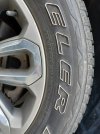For reference, I thought I would continue to add to the info here on first time towing...
We picked up our new to us Camper this week. It's 23', with a GVWR of 6,000#, dry weight 5,161#. My truck is a '21 Ram 1500 CC 5'7" bed 4x2, with the 5.7 Hemi and 3.92 rear end. The camper came with an Equal-i-zer hitch. The previous owner towed with a Tundra. Comparing receiver heights, I'm about 17" off the ground on the 20" tires, his receiver sits a little lower by maybe 3/4".
I haven't had a chance yet to check the hitch head height to see where the ball sits relative to a level trailer, but it's fairly close. Putting the weight bars onto the ledges is very easy; maybe too easy. I "think" not much weight goes on when the tongue jack is raised.
This week we did two runs, from Bradenton to Tampa, and then from Tampa back to storage in Venice. I'm seeing about 12.5 mpg at a more or less steady 65 mph on I-75 in fairly heavy holiday traffic. Towing, the rig is pretty lively on the road with continuous but small steering corrections needed. "Seat of the pants" would tell me that I need more weight on the front end, which is consistent with the ease of raising the weight bars. For sure, the rig doesn't feel nearly as stable as my Ram 2500+ProPride PPP hitch+30' 8,500# camper. I did maybe 50K miles with that combo across the US over a couple years; it was a very solid setup for towing.
I have to go through the front axle level restoration process and do the measurements, but as soon as I do, I'll post back. My suspicion at this point is I'll either add a washer to the shank or (easier) raise the ledge brackets one hole to move the bars up and xfer more weight to the front. I've done the three-pass CAT scale method to check axle weights, but it's not nearly as simple as just measuring the front axle height, so I'll just start with that when I have a spare couple hours and a level flat parking lot somewhere.
Appreciate any comments from ya'll.












